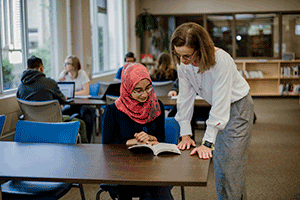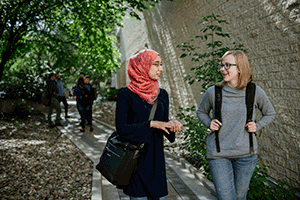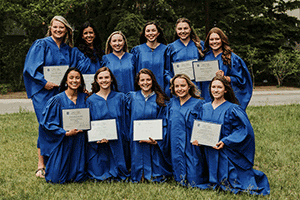Ready to learn more?
Get all the details straight to your inbox!

Smaller class sizes at Luther College means more individualized attention and better connections with your professors, classmates, and academic advisors.

Luther College is recognized for its high standards of teaching, focused research, and one-on-one academic advising. We value and protect this heritage of excellence in scholarship, freedom of inquiry, and faithful seeking after truth.

Luther College offers Bundles programs that group together first-year students and classes to give you a great start and help ease the transition from high school to university.

You can book a tour of Luther College, the U of R campus, and our student residence, The Student Village at Luther College, any time throughout the year. Contact our Recruitment Office at 1-306-206-2117.

The priority deadline for academic application is March 15. To book a personalized enrolment counselling appointment, contact our Recruitment Office at 1-306-206-2117.

Our student residence, The Student Village at Luther College, welcomes residents from ALL post-secondary institutions in Regina. Rooms come with a meal plan, free laundry, free wi-fi, and a great sense of community.

Luther students can register in Arts, Science, or Media, Art, and Performance. Luther students are U of R students and receive a U of R degree.

Luther College students are U of R students and receive all the same benefits. Upon graduation you will receive a U of R degree.
Get all the details straight to your inbox!
Independent Study
Research
Online taught course. This course explores the depth and breadth of cultural identities, exchanges and interactions in Europe in the sixteenth and seventeenth centuries. It will examine the role of religion, ethnicity, race and class in shaping early modern identities and informing cultural interactions during this period of violent upheaval and change. ***Prerequisite: One HIST course or completion of 30 credit hours***
Lab linked with MATH 110-L40
An introductory class in the theory and techniques of differentiation and integration of algebraic and trigonometric functions. Topics include limits, optimization, curve sketching, and areas. ***Prerequisite: Precalculus 30 with at least 75%, or Calculus 30 or Mathematics B30 and C30 with a grade of at least 65% in each or Math 102*** *Note: Students can receive credit for only one of MATH 103 or 110* Labs will start from the second week.
Online delivered course. Covers the fundamentals and challenges of fundraising and resource development in non-profit and voluntary sector organizations. Topics covered will include working through the donor cycle, the importance of relationship building, establishing revenue streams, grant-writing, and the role of the Board and governance for organizational sustainability. ***Prerequisite: NSLI 100 or 12 credit hours, or permission of the Program Director.*** *Note: NSLI 100 may be taken concurrently.* *Note: Students may receive credit for one of NSLI 390AB or NSLI 370.*
Thesis research
Thesis research
Thesis research
Thesis research
An introduction to the study of adjustment, disorders, development, personality and the social environment of the person.
A survey of theory and research related to individual differences in thinking, feeling, and behaving. ***Prerequisite: PSYC 101 and PSYC 102.***
Hyflex- online/onsite flexible Instructional Method. This course will explore the ways in which selected Eastern and Western religious traditions understand and negotiate death as a major life-cycle transition. Topics will include preparation for dying, funerary practices and memorial rites, nonphysical reality and the afterlife, as well as cultural variations in the expression of bereavement; varieties of interpretation. ***Prerequisites: Completion of 12 credit hours or RLST 100.***
Remote course delivery. Religious teachings on sexual practices, desires and orientations have regulated social norms and notions of morality. Examining a number of religious traditions, historical moments and current religious, feminist and queer movements, this course invites students to discern tropes and potentiality within the larger discourse of personal agency and social power. ***Prerequisite: Completion of 12 credit hours or RLST 100.*** *Note: Students may receive credit for one of RLST 290AP, RLST 390BL, or WGST 490AC.*
An introduction to the academic study of religion; a survey of the thought and practices of major world religions; the impact of religion on society and culture.
Remote delivered course. Religious teachings on sexual practices, desires and orientations have regulated social norms and notions of morality. Examining a number of religious traditions, historical moments and current religious, feminist and queer movements, this course invites students to discern tropes and potentiality within the larger discourse of personal agency and social power. ***Prerequisite: WGST 100, or permission of the Department Head.*** *Note: Students may receive credit for one of WGST 280AK, WGST 490AC, RLST 290AP, or RLST 390BL.*
For English/Science students only. Must also register in ENGL 100-L01 & CHEM 104-003. An examination of biological molecules, cell structure and fundamental cellular processes, bioenergetics, genetics, evolution, and animal and plant physiology. *Notes: Biology 30 and Chemistry 30 are strongly recommended as background preparation. This course is designed for biology majors, pre-professional students, secondary education science students, and those wanting two semesters of biology. Students seeking a single semester introductory course are advised to take Biology 140 or 150*
Hyflex- online/onsite flexible Instructional Method. An introductory level course covering the principles of biology with examples taken from humans. * Note: This course is designed to apply the study of biological principles to humans. Biology majors cannot take this course for credit. Students cannot receive credit for both BIOL 140 and 150. Students who have credit for either BIOL 100 or BIOL 101 cannot subsequently receive credit for either of BIOL 140 or BIOL 150. *
Lab linked to BIOL 140-L01 and BIOL 140-L05
Lab linked to BIOL 140-L01 and BIOL 140-L05
Lab linked to BIOL 140-L01 and BIOL 140-L05
Luther students only. An introductory level course covering the principles of biology with examples taken from humans. * Note: This course is designed to apply the study of biological principles to humans. Biology majors cannot take this course for credit. Students cannot receive credit for both BIOL 140 and 150. Students who have credit for either BIOL 100 or BIOL 101 cannot subsequently receive credit for either of BIOL 140 or BIOL 150. *
Hyflex- online/onsite flexible Instructional Method. This course is a survey of basic modern biological principles. Topics will include: origin of life, basic cell structure and function, evolution, an outline of organism diversity, ecological principles, and selected functions of multicellular organisms. *Note: Designed for students who do not intend to be biology majors and who are not in pre-professional programs. Students cannot receive credit for both BIOL 140 and 150. Students who have credit for BIOL 100 or BIOL 101 cannot subsequently receive credit for either of BIOL 140 or BIOL 150.*
Lab linked with BIOL 150-L01
Lab linked with BIOL 150-L01
Research
For ENGL/SCI students only. Must also register in BIOL 100-L01 & CHEM 104-003. Luther students only until 11:00AM on April 25th. Hyflex- online/onsite flexible Instructional Method. This course develops students' proficiency in critical reading and writing through the study of a wide range of non-literary and literary texts, and the study of composition, with emphasis on connections between modes of reading and writing. *Note: Students who are planning to repeat ENGL 100 should seek academic advising before doing so*
CRIME/JUSTICE Students only. Must also register in PSYC 101-L02. Hyflex- online/onsite flexible Instructional Method. This course develops students' proficiency in critical reading and writing through the study of a wide range of non-literary and literary texts, and the study of composition, with emphasis on connections between modes of reading and writing. *Note: Students who are planning to repeat ENGL 100 should seek academic advising before doing so*
This course develops students' proficiency in critical reading and writing through the study of a wide range of non-literary and literary texts, and the study of composition, with emphasis on connections between modes of reading and writing. *Note: Students who are planning to repeat ENGL 100 should seek academic advising before doing so*
This course develops students' proficiency in critical reading and writing through the study of a wide range of non-literary and literary texts, and the study of composition, with emphasis on connections between modes of reading and writing. *Note: Students who are planning to repeat ENGL 100 should seek academic advising before doing so*
This course develops students' proficiency in critical reading and writing through the study of a wide range of non-literary and literary texts, and the study of composition, with emphasis on connections between modes of reading and writing. *Note: Students who are planning to repeat ENGL 100 should seek academic advising before doing so*
For Business Students only. This course develops students' proficiency in critical reading and writing through the study of a wide range of non-literary and literary texts, and the study of composition, with emphasis on connections between modes of reading and writing. *Note: Students who are planning to repeat ENGL 100 should seek academic advising before doing so*
A study of a special topic in literature, which may include non-literary texts, in conjunction with a continuation of the writing program begun in ENGL 100. ***Prerequisite: ENGL 100.*** *Note: Every section of ENGL 110 has a different focus. Please consult the Department's Supplementary Calendar or the list of current course offerings on the Departmental website.* *Note: Students who fail ENGL 110 twice should contact their faculty or their federated college immediately.*
A survey of literature in English from the Middle Ages to 1800. ***Prerequisite: ENGL 100 and either ENGL 110 or completion of 24 credit hours.***
Online delivered course. A survey of Canadian Literature in English from the pre-twentieth century to the present day. ***Prerequisite: ENGL 100 and either ENGL 110 or completion of 24 credit hours.***
An introduction to the human and natural environments from a geographical perspective. The fundamental themes, of human and physical geography are examined by focusing upon global issues and regional patterns. *Note: Students may receive credit for only one of GES 100 and GEOG 100.*
Explanation of human placement in and interaction with the natural environment; assessment of concepts, processes, and patterns as related to distribution of human phenomena, including economic activity and settlement types. *Note: Students may receive credit for only one of GES 120, GEOG 120, or GEOG 220.*
The so-called "Third World" is examined from a spatial perspective. Topics of investigation include imperialism, population growth, political boundaries, and economic transition. ***Prerequisite: 30 credit hours including one of GES 100 or GES 120, or permission of the Department Head.*** *Note: Students may receive credit for only one of GES 316 and GEOG 316.*
An exploration of major themes, periods and events in European history, this course introduces students to the methods and sources of historical study, familiarizes them with significant developments in the history of Europe and places that history in a global context. *Note: Students may receive credit for only one of HIST 106, 107, 108 or 115.*
Luther students only. An exploration of major themes, periods and events in European history, this course introduces students to the methods and sources of historical study, familiarizes them with significant developments in the history of Europe and places that history in a global context. *Note: Students may receive credit for only one of HIST 106, 107, 108 or 115.*
This course explores the influence of the past on the world in which we live. Topics addressed will be taken from today’s headlines and will reflect a wide variety of periods and geographical areas. Topics may include terrorism, environmentalism, war, demonstrations, popular culture, the welfare state, global crises.
Online delivered course. This course examines the Italian Renaissance in art, culture and thought; overseas explorations; Protestant and Catholic Reformations; rise of the nation state; the Thirty Years War; the Scientific Revolution. *** Prerequisite: One 100 level HIST or completion of 15 credit hours ***
This course surveys the history of medicine by exploring how concepts of healing, disease, and the body have changed over time. Themes to be explored include: the role of magic and religion in healing, social impact of contagious disease, gender and reproduction, mental illness, and the development of medical professions. ***Prerequisite: One 100 level HIST course or completion of 15 credit hours ***
Differentiation of algebraic, exponential, and logarithmic functions. Optimization, curve sketching, and integration by substitution. ***Prerequisite: Precalculus 30 or Mathematics B30 with a grade of at least 65% or AMTH 092 with a grade of at least 80%, or Math 102*** *Note: Although Math 103 leads to Math 112, students who require three or more calculus-based courses should take Math 110 instead of Math 103. Students will only receive credit for one of MATH 103 or 110*
Lab linked with MATH 103-L01
An introductory class in the theory and techniques of differentiation and integration of algebraic and trigonometric functions. Topics include limits, optimization, curve sketching, and areas. ***Prerequisite: Precalculus 30 with at least 75%, or Calculus 30 or Mathematics B30 and C30 with a grade of at least 65% in each or Math 102*** *Note: Students can receive credit for only one of MATH 103 or 110* Labs will start from the second week.
For Engl/Science students only. An introductory class in the theory and techniques of differentiation and integration of algebraic and trigonometric functions. Topics include limits, optimization, curve sketching, and areas. ***Prerequisite: Precalculus 30 with at least 75%, or Calculus 30 or Mathematics B30 and C30 with a grade of at least 65% in each or Math 102*** *Note: Students can receive credit for only one of MATH 103 or 110* Labs will start from the second week.
Lab linked with MATH 110-L01 and MATH 110-L02
A course intended to introduce students to elementary linear algebra, particularly at a computational and applied level. Topics include matrices and systems of equations, inversion, determinants, vectors, inner products, eigenvectors and eigenvalues. ***Prerequisite: Precalculus 30, Mathematics B30 and C30, or Math 102.***
Lab linked with MATH 122-L01
Series solutions of linear equations, systems of linear first-order equations, Fourier series, boundary-value problems, integral transforms, and numerical methods. ***Prerequisite: MATH 217.***
What would life be without music? This broad survey course explores the changing role of music within society across time and disciplines, with emphasis on developing critical listening skills. * Note: Not available for credit in BMus or BMusEd programs.*
This course traces the development of important musical styles, genres and forms from the second half of the 18th century to the late 20th century by placing representative composers and selected musical works into their appropriate socio-cultural and historical contexts. Emphasis is on developing basic listening, writing and research skills. ***Prerequisite: Music reading ability*** *Note: Students cannot receive credit for both MU 202 and MUHI 202.
A wide-ranging study of the history of music in Canada, from the earliest settlements to the present day. Topics covered include classical, popular and indigenous genres. Emphasis is on the socio-cultural role of music in the evolution of Canada as a country. ***Prerequisite: MUHI 202 or permission of Department Head*** *Note: Students cannot receive credit for both MU 215 and MUHI 305*
Online delivered course. An introduction to the nonprofit and voluntary sector in Canada and the organizations that comprise it. The course examines the history, size, scope, and roles of the sector in society, relationships with government and other sectors and accountability in the context of governing and managing a private not-for-profit corporation. *Note: Students may receive credit for one of NSLI 100, IDS 290AA or NSLI 200.*
Blend
Blend
The NSLI Internship consists of a 13-week part-time placement at a host organization partner, in which the student intern performs work on designated projects. ** Permission from the NVSSN Director is required to register. Email colleen.strauch@uregina.ca for information on how to register.
This introduction to philosophy will explore how philosophy can provide answers to some of the more profound questions we face, such as questions concerning knowledge, truth, mind and body, personal identity, free will, morality, politics, reasoning and the existence of God. * Note: Topics will vary with sections of this course *
An introduction to the systematic study of reasoning, this course will teach the theory and practice of good reasoning. It will provide students with reasoning skills that are useful in whichever discipline and career they may pursue.
An introduction to the systematic study of reasoning, this course will teach the theory and practice of good reasoning. It will provide students with reasoning skills that are useful in whichever discipline and career they may pursue.
Hyflex- online/onsite flexible Instructional Method. A philosophical consideration of such contemporary moral issues as racism, sexism, abortion, the right to privacy, adultery, homosexuality, capital punishment, pacifism, the obligation to obey laws, and social justice. *** Prerequisite: PHIL 100 or completion of 15 credit hours ***
This introduction to philosophy will explore how philosophy can provide answers to some of the more profound questions we face, such as questions concerning knowledge, truth, mind and body, personal identity, free will, morality, politics, reasoning and the existence of God. * Note: Topics will vary with sections of this course *
CRIME/JUSTICE Bundle students only. Hyflex- online/onsite flexible Instructional Method. An introduction to the study of adjustment, disorders, development, personality and the social environment of the person.
An introduction to biological, cognitive, and social aspects of psychological development across the lifespan. ***Prerequisite: PSYC 101 and PSYC 102.***
Luther students only. An introduction to biological, cognitive, and social aspects of psychological development across the lifespan. ***Prerequisite: PSYC 101 and PSYC 102.***
Online delivered course. An overview of the field of forensic psychology – the intersection of psychology and the law. Topics include: psychology of police investigations, deception, eyewitness testimony, child victims and witnesses, juries, mental illness in court, sentencing and parole, domestic violence, sexual offenders, psychopathy, risk assessment, and special offender populations. ***Prerequisite: PSYC 101 and PSYC 102, or 60 credit hours and permission of the Department Head.*** *Note: Students may receive credit for one of PSYC 321 or PSYC 320 as a forensic course.* *Note: This course will initially be restricted to PSYC majors and Certificate in Forensic Psychology students. Non-majors will be eligible to register at a later point if space remains.*
An examination of the major theories, research methodologies, and data in the field of the psychology of women. Philosophical values of feminism and the psychological impact of women's historical roles in society, and cultural perspectives pertaining to women will be considered throughout. ***Prerequisite: PSYC 101, PSYC 102, and two 200 level courses in the social sciences, or permission of the Department Head.*** *Note: This course will initially be restricted to PSYC majors. Non-majors will be eligible to register at a later point if space remains.*
Online delivered course. An examination of deception (e.g., lying, cheating) across the lifespan. Topics may include: how children learn to lie, the (im)morality of deception, methods of lie-detection and honesty-promotion across contexts (e.g., parenting, forensic, education), atypical lie-telling, and cheating. Legal and social implications will be discussed. ***Prerequisite: PSYC 101 and PSYC 102.*** *Note: This course will initially be restricted to PSYC majors and Certificate in Forensic Psychology students. Non-majors will be eligible to register at a later point if space remains.*
Thesis research
Thesis research
Online delivered course. An overview of the field of forensic psychology – the intersection of psychology and the law. Topics include: psychology of police investigations, deception, eyewitness testimony, child victims and witnesses, juries, mental illness in court, sentencing and parole, domestic violence, sexual offenders, psychopathy, risk assessment, and special offender populations. ***Prerequisite: PSYC 101 and PSYC 102, or 60 credit hours and permission of the Department Head.*** *Note: Students may receive credit for one of PSYC 321 or PSYC 320 as a forensic course.* *Note: This course will initially be restricted to PSYC majors and Certificate in Forensic Psychology students. Non-majors will be eligible to register at a later point if space remains.*
An introduction to the academic study of religion; a survey of the thought and practices of major world religions; the impact of religion on society and culture.
Hyflex- online/onsite flexible Instructional Method. A survey of the various books of the Hebrew Bible (Old Testament or Tanakh) from historical, literary, and theological perspectives. ***Prerequisite: Completion of 12 credit hours or RLST 100.***
Hyflex- online/onsite flexible Instructional Method. An introduction to reading the Qur'an, the Muslim holy book, in English translation; exploration of the Qur'an's main themes, literary structures, origins, and varieties of interpretation. No prior knowledge of the Qur'an or of Islam is required. ***Prerequisites: Completion of 12 credit hours or RLST 100.***
An introduction to statistical methods; descriptive statistics; the normal distribution; basic techniques of statistical inference; confidence intervals and hypothesis tests for population means and proportions; simple linear regression; and one-way analysis of variance. ***Prerequisite: Foundations of Math 20 or Precalculus 20 or Apprenticeship & Workplace Math 30 or MATH A30 or AMTH 091 or MATH 101*** *Note: STAT 100 and STAT 200 are designed to provide a year-long introduction to statistical methodology with a view towards applications and are not intended for majors in statistics, actuarial science, or any other program requiring a detailed knowledge of statistics. Students who receive credit for STAT 100 may not receive credit for STAT 160*
Luther students only. An introduction to statistical methods; descriptive statistics; the normal distribution; basic techniques of statistical inference; confidence intervals and hypothesis tests for population means and proportions; simple linear regression; and one-way analysis of variance. ***Prerequisite: Foundations of Math 20 or Precalculus 20 or Apprenticeship & Workplace Math 30 or MATH A30 or AMTH 091 or MATH 101*** *Note: STAT 100 and STAT 200 are designed to provide a year-long introduction to statistical methodology with a view towards applications and are not intended for majors in statistics, actuarial science, or any other program requiring a detailed knowledge of statistics. Students who receive credit for STAT 100 may not receive credit for STAT 160*
An introduction to statistical methods; descriptive statistics; the normal distribution; basic techniques of statistical inference; confidence intervals and hypothesis tests for population means and proportions; simple linear regression; and one-way analysis of variance. ***Prerequisite: Foundations of Math 20 or Precalculus 20 or Apprenticeship & Workplace Math 30 or MATH A30 or AMTH 091 or MATH 101*** *Note: STAT 100 and STAT 200 are designed to provide a year-long introduction to statistical methodology with a view towards applications and are not intended for majors in statistics, actuarial science, or any other program requiring a detailed knowledge of statistics. Students who receive credit for STAT 100 may not receive credit for STAT 160*
Luther students only. An introduction to statistical methods; descriptive statistics; the normal distribution; basic techniques of statistical inference; confidence intervals and hypothesis tests for population means and proportions; simple linear regression; and one-way analysis of variance. ***Prerequisite: Foundations of Math 20 or Precalculus 20 or Apprenticeship & Workplace Math 30 or MATH A30 or AMTH 091 or MATH 101*** *Note: STAT 100 and STAT 200 are designed to provide a year-long introduction to statistical methodology with a view towards applications and are not intended for majors in statistics, actuarial science, or any other program requiring a detailed knowledge of statistics. Students who receive credit for STAT 100 may not receive credit for STAT 160*
A continuation of STAT 100; inference for two categorical variables; basic multiple linear regression; two-way analysis of variance; introduction to nonparametric methods; statistical process control; introduction to survey design. ***Prerequisite: STAT 100*** *Note: STAT 100 and STAT 200 are designed to provide a year-long introduction to statistical methodology with a view towards applications and are not intended for majors in statistics, actuarial science, or any other program requiring a detailed knowledge of statistics. Students who receive credit for STAT 200 may not receive credit for STAT 160*
Luther students only. A continuation of STAT 100; inference for two categorical variables; basic multiple linear regression; two-way analysis of variance; introduction to nonparametric methods; statistical process control; introduction to survey design. ***Prerequisite: STAT 100*** *Note: STAT 100 and STAT 200 are designed to provide a year-long introduction to statistical methodology with a view towards applications and are not intended for majors in statistics, actuarial science, or any other program requiring a detailed knowledge of statistics. Students who receive credit for STAT 200 may not receive credit for STAT 160*
Hyflex- online/onsite flexible Instructional Method. This course will examine the historical development of feminism and women's studies. Women's representation in academic practice will be analyzed using examples from humanities, the arts, and social sciences. Strategies for change and for the empowerment of women will be considered.
Luther students only. Hyflex- online/onsite flexible Instructional Method. This course will examine the historical development of feminism and women's studies. Women's representation in academic practice will be analyzed using examples from humanities, the arts, and social sciences. Strategies for change and for the empowerment of women will be considered.
Hyflex- online/onsite flexible Instructional Method. An introductory level course covering the principles of biology with examples taken from humans. * Note: This course is designed to apply the study of biological principles to humans. Biology majors cannot take this course for credit. Students cannot receive credit for both BIOL 140 and 150. Students who have credit for either BIOL 100 or BIOL 101 cannot subsequently receive credit for either of BIOL 140 or BIOL 150. *
Lab linked to BIOL 140-L01
Lab linked to BIOL 140-L01
Lab linked to BIOL 140-L01
Taught in French. An introductory level course covering the principles of biology with examples taken from humans. * Note: This course is designed to apply the study of biological principles to humans. Biology majors cannot take this course for credit. Students cannot receive credit for both BIOL 140 and 150. Students who have credit for either BIOL 100 or BIOL 101 cannot subsequently receive credit for either of BIOL 140 or BIOL 150. *
Taught in French. Lab linked with BIOL 140-L06.
Online delivered course. An introductory level course covering the principles of biology with examples taken from humans. * Note: This course is designed to apply the study of biological principles to humans. Biology majors cannot take this course for credit. Students cannot receive credit for both BIOL 140 and 150. Students who have credit for either BIOL 100 or BIOL 101 cannot subsequently receive credit for either of BIOL 140 or BIOL 150. *
Online delivered course. An introductory level course covering the principles of biology with examples taken from humans. * Note: This course is designed to apply the study of biological principles to humans. Biology majors cannot take this course for credit. Students cannot receive credit for both BIOL 140 and 150. Students who have credit for either BIOL 100 or BIOL 101 cannot subsequently receive credit for either of BIOL 140 or BIOL 150. *
Online delivered lab.
The intent of this course is to provide a basic introduction to pathogens and the concept of diseases. This course covers bacteria, viruses and eukaryotes, with emphasis on emergent diseases and urgent challenges for public health. ***Prerequisite: BIOL 100 and BIOL 101*** *Note: Students who have received credit for BIOL 303 may not subsequently receive credit for BIOL 224.*
Lab
Lab
Lab
Luther students only. The intent of this course is to provide a basic introduction to pathogens and the concept of diseases. This course covers bacteria, viruses and eukaryotes, with emphasis on emergent diseases and urgent challenges for public health. ***Prerequisite: BIOL 100 and BIOL 101*** *Note: Students who have received credit for BIOL 303 may not subsequently receive credit for BIOL 224.*
Aetiology, pathogenesis, diagnosis, treatment and epidemiology of infectious diseases of humans, caused by bacterial, viral, fungal and parasitic organisms. ***Prerequisites: BIOL 224 and 288***
Research
Research
This course develops students' proficiency in critical reading and writing through the study of a wide range of non-literary and literary texts, and the study of composition, with emphasis on connections between modes of reading and writing. *Note: Students who are planning to repeat ENGL 100 should seek academic advising before doing so*
Restricted to English/Science Bundle students. Hyflex- online/onsite flexible Instructional Method. A study of a special topic in literature, which may include non-literary texts, in conjunction with a continuation of the writing program begun in ENGL 100. ***Prerequisite: ENGL 100.*** *Note: Every section of ENGL 110 has a different focus. Please consult the Department's Supplementary Calendar or the list of current course offerings on the Departmental website.* *Note: Students who fail ENGL 110 twice should contact their faculty or their federated college immediately.*
A study of a special topic in literature, which may include non-literary texts, in conjunction with a continuation of the writing program begun in ENGL 100. ***Prerequisite: ENGL 100.*** *Note: Every section of ENGL 110 has a different focus. Please consult the Department's Supplementary Calendar or the list of current course offerings on the Departmental website.* *Note: Students who fail ENGL 110 twice should contact their faculty or their federated college immediately.*
A study of a special topic in literature, which may include non-literary texts, in conjunction with a continuation of the writing program begun in ENGL 100. ***Prerequisite: ENGL 100.*** *Note: Every section of ENGL 110 has a different focus. Please consult the Department's Supplementary Calendar or the list of current course offerings on the Departmental website.* *Note: Students who fail ENGL 110 twice should contact their faculty or their federated college immediately.*
A study of a special topic in literature, which may include non-literary texts, in conjunction with a continuation of the writing program begun in ENGL 100. ***Prerequisite: ENGL 100.*** *Note: Every section of ENGL 110 has a different focus. Please consult the Department's Supplementary Calendar or the list of current course offerings on the Departmental website.* *Note: Students who fail ENGL 110 twice should contact their faculty or their federated college immediately.*
A study of a special topic in literature, which may include non-literary texts, in conjunction with a continuation of the writing program begun in ENGL 100. ***Prerequisite: ENGL 100.*** *Note: Every section of ENGL 110 has a different focus. Please consult the Department's Supplementary Calendar or the list of current course offerings on the Departmental website.* *Note: Students who fail ENGL 110 twice should contact their faculty or their federated college immediately.*
The craft of creative writing, with work in poetry, drama or non-fiction, and prose fiction. ***Prerequisite: ENGL 100 and either ENGL 110 or ENGL 152.***
This course will examine some familiar and unfamiliar literary representations of pirates, along with historical documents and contemporary accounts. We will consider the intersection of fiction and history, and will also consider how the popular image of the pirate comments on ideas of masculinity, ethics, and the individual’s relationship to the state. ***Prerequisite: ENGL 100 and either ENGL 110 or completion of 48 credit hours.***
Remote delivered course. An examination of several well-known books for children, focusing on human relations with the natural world. ***Prerequisite: ENGL 100 and either ENGL 110 or completion of 48 credit hours.***
Explanation of human placement in and interaction with the natural environment; assessment of concepts, processes, and patterns as related to distribution of human phenomena, including economic activity and settlement types. *Note: Students may receive credit for only one of GES 120, GEOG 120, or GEOG 220.*
Employing multiple analytical approaches, this course examines the economic, social, cultural, and environmental factors and processes of recreation and tourism, and their implications on the environment, space, and place, at a variety of geographical and temporal scales. ***Prerequisite: GES 100 or GES 120, or permission of the Department Head.*** *Note: Students may receive credit for only one of GES 232, GEOG 232, or GEOG 332.*
The effect of political action on present-day geography, and of geography on political problems. ***Prerequisite: 30 credit hours including GES 100 or GES 120, or permission of the Department Head.*** *Note: Students may receive credit for only one of GES 330 and GEOG 330.*
This course explores the influence of the past on the world in which we live. Topics addressed will be taken from today’s headlines and will reflect a wide variety of periods and geographical areas. Topics may include terrorism, environmentalism, war, demonstrations, popular culture, the welfare state, global crises.
This course examines the social history of Europe from the 15th to the 18th centuries through a focus on issues related to gender, sexuality and the body. It includes topics such as: gender definitions, marriage and family, sexuality and morality, and clothing and fashion. *** Prerequisite: One 100-level HIST course or completion of 15 credit hours ***
An introduction to the histories and diverse cultures of Africa from the earliest times to the era of colonization in the 19th century. Attention is given to the roots of African peoples in antiquity, processes of regional differentiation, and evolving patterns of trade, politics and conflict. ***Prerequisite: One 100 level HIST or completion of 15 credit hours***
Examination of the origins, development, and decline of the witch persecutions in Western Europe from 1400-1700. Students will learn how historians draw on fields such as feminist theory, psychology, sociology, and anthropology in order to understand the complexities of this topic. *** Prerequisite: One HIST course or completion of 30 credit hours ***
This course will examine various topics of critical interest in the 21st Century, possibly including, but not limited to: religious diversity, social constructions of identity, consumer choices, sustainable livelihoods, and current environmental issues. We will explore ideas about locating ourselves and developing agency in a changing and challenging world. Oral and written communication skills are developed through in-class group work and informal and formal presentations. Coordinated by one faculty member, this course draws on the expertise of instructional faculty from different disciplines. Community service learning through volunteer work (approximately 12 hours for the semester) will complement the academic component of this course.
An introductory class in the theory and techniques of differentiation and integration of algebraic and trigonometric functions. Topics include limits, optimization, curve sketching, and areas. ***Prerequisite: Precalculus 30 with at least 75%, or Calculus 30 or Mathematics B30 and C30 with a grade of at least 65% in each or Math 102*** *Note: Students can receive credit for only one of MATH 103 or 110* Labs will start from the second week.
Lab linked to MATH 110-L01
Differentiation and integration of exponential and logarithmic functions; methods of integration and applications; indeterminate forms, L'Hospital's rule and improper integrals; sequences, series, power series and Taylor series. ***Prerequisite: MATH 110, or MATH 103 with a grade of at least 80%***
Luther students only. Differentiation and integration of exponential and logarithmic functions; methods of integration and applications; indeterminate forms, L'Hospital's rule and improper integrals; sequences, series, power series and Taylor series. ***Prerequisite: MATH 110, or MATH 103 with a grade of at least 80%***
Lab linked to MATH 111-L01 and MATH 111-L02
A course intended to introduce students to elementary linear algebra, particularly at a computational and applied level. Topics include matrices and systems of equations, inversion, determinants, vectors, inner products, eigenvectors and eigenvalues. ***Prerequisite: Precalculus 30, Mathematics B30 and C30, or Math 102.***
Lab linked to MATH 122-L01
A study of vector functions and functions of several variables and their derivatives; Applied maximum and minimum problems, Lagrange multipliers, multiple integration, integration in polar, cylindrical and spherical coordinates; Green's, Stokes' and the Divergence Theorem. ***Prerequisite: MATH 111 and 122***
Lab linked to MATH 213-L01
Ordinary differential equations, modelling with differential equations, Laplace transforms. ***Prerequisite: MATH 111 and MATH 122***
Least squares and other approximations. Difference equations. Solutions of algebraic systems. Symbol manipulators. ***Prerequisite: MATH 213 and either MATH 261 or CS 261.***
This course is geared toward MAP students majoring in music, who have successfully completed MUHI 202. This course traces the development of important early musical styles, genres, and forms by placing representative composers and selected musical works into their appropriate socio-cultural and historical contexts. Emphasis is on students honing their listening, writing, research and presentation skills. ***Prerequisite: MUHI 202 or permission of Department Head*** *Note: Students cannot receive credit for both MU 203 and MUHI 203*
The goal of this seminar course is to explore critically what, and question how women have contributed – especially as composers, performers, teachers, listeners, and muses – to musical traditions and cultures of the past and present. Students will hone their oral, listening, and writing skills and prepare a semester-long scholarly journal meant to facilitate new portals of understanding in lieu of tests and exams. NOTE: Attendance of concerts off-campus is required. Non-music majors who wish to take this class as an elective should contact the instructor directly; the completion of MU 100 or MUHI 202 will be an asset.
Online delivered course. An introduction to the nonprofit and voluntary sector in Canada and the organizations that comprise it. The course examines the history, size, scope, and roles of the sector in society, relationships with government and other sectors and accountability in the context of governing and managing a private not-for-profit corporation. *Note: Students may receive credit for one of NSLI 100, IDS 290AA or NSLI 200.*
Communications with the general public, governments, other nonprofits, businesses, media, funders and donors in order to build intentional relationships are explored. Theory and practice are integrated in examining relationships and accountabilities. New perspectives on social media, virtual/public presence, branding, key messages, and time-sensitive response mechanisms are discussed. ***Prerequisite: NSLI 100 or 12 credit hours, or permission of the Program Director.*** *Note: NSLI 100 may be taken concurrently.* *Note: Students may receive credit for one of NSLI 230 or NSLI 330.*
Online delivered course. The course emphasizes theoretical and practical considerations in the governance of nonprofit organizations. It focuses on what boards, the volunteers who serve on them do, and how they do it to maximize nonprofit governance and organizational effectiveness. Emphasis on competencies of highly effective boards, CEOs, board chairs, and leadership volunteers. ***Prerequisite: NSLI 100, or 12 credit hours, or permission of the Department.*** *Note: NSLI 100 may be taken concurrently.* *Note: Formerly numbered NSLI 360. Students may receive credit for only one of NSLI 360 or NSLI 260.*
Remote delivered course. Effective program planning and evaluation based on understanding the shifting external environment in which staff and volunteers operate, as well as their internal environment. Includes mixed methods research; external environment trend analyses and projections; internal organization database management and analytic strategies; program evaluation and decision-making models; and special projects management.
This introduction to philosophy will explore how philosophy can provide answers to some of the more profound questions we face, such as questions concerning knowledge, truth, mind and body, personal identity, free will, morality, politics, reasoning and the existence of God. * Note: Topics will vary with sections of this course *
An introduction to the systematic study of reasoning, this course will teach the theory and practice of good reasoning. It will provide students with reasoning skills that are useful in whichever discipline and career they may pursue.
An introduction to the systematic study of reasoning, this course will teach the theory and practice of good reasoning. It will provide students with reasoning skills that are useful in whichever discipline and career they may pursue.
This introduction to philosophy will explore how philosophy can provide answers to some of the more profound questions we face, such as questions concerning knowledge, truth, mind and body, personal identity, free will, morality, politics, reasoning and the existence of God. * Note: Topics will vary with sections of this course *
An introduction to the study of adjustment, disorders, development, personality and the social environment of the person.
Hyflex- online/onsite flexible Instructional Method. An introduction to biological, cognitive, and social aspects of psychological development across the lifespan. ***Prerequisite: PSYC 101 and PSYC 102.***
An overview of the field of forensic psychology – the intersection of psychology and the law. Topics include: psychology of police investigations, deception, eyewitness testimony, child victims and witnesses, juries, mental illness in court, sentencing and parole, domestic violence, sexual offenders, psychopathy, risk assessment, and special offender populations. ***Prerequisite: PSYC 101 and PSYC 102, or 60 credit hours and permission of the Department Head.*** *Note: Students may receive credit for one of PSYC 321 or PSYC 320 as a forensic course.* *Note: This course will initially be restricted to PSYC majors and Certificate in Forensic Psychology students. Non-majors will be eligible to register at a later point if space remains.*
An overview of the field of forensic psychology – the intersection of psychology and the law. Topics include: psychology of police investigations, deception, eyewitness testimony, child victims and witnesses, juries, mental illness in court, sentencing and parole, domestic violence, sexual offenders, psychopathy, risk assessment, and special offender populations. ***Prerequisite: PSYC 101 and PSYC 102, or 60 credit hours and permission of the Department Head.*** *Note: Students may receive credit for one of PSYC 321 or PSYC 320 as a forensic course.* *Note: This course will initially be restricted to PSYC majors and Certificate in Forensic Psychology students. Non-majors will be eligible to register at a later point if space remains.*
Online delivered course. This course examines biological, personality, and social theories and empirical research in the context of understanding criminal and violent behaviour. Topics covered will include: offender assessment and classification, offender treatment, criminal pathways to and desistance from crime, prevalence, and types of offenders. ***Prerequisite: PSYC 101 and PSYC 102.*** *Note: This course will initially be restricted to PSYC majors and Certificate in Forensic Psychology students. Non-majors will be eligible to register at a later point if space remains.*
Online delivered course. This course examines biological, personality, and social theories and empirical research in the context of understanding criminal and violent behaviour. Topics covered will include: offender assessment and classification, offender treatment, criminal pathways to and desistance from crime, prevalence, and types of offenders. ***Prerequisite: PSYC 101 and PSYC 102.*** *Note: This course will initially be restricted to PSYC majors and Certificate in Forensic Psychology students. Non-majors will be eligible to register at a later point if space remains.*
An examination of the major theories, research methodologies, and data in the field of the psychology of women. Philosophical values of feminism and the psychological impact of women's historical roles in society, and cultural perspectives pertaining to women will be considered throughout. ***Prerequisite: PSYC 101, PSYC 102, and two 200 level courses in the social sciences, or permission of the Department Head.*** *Note: This course will initially be restricted to PSYC majors. Non-majors will be eligible to register at a later point if space remains.*
A research thesis in psychology. **Permission of the Department Head is required to register.** *Note: This course will initially be restricted to PSYC majors. Non-majors will be eligible to register at a later point if space remains.*
A research thesis in psychology. **Permission of the Department Head is required to register.** *Note: This course will initially be restricted to PSYC majors. Non-majors will be eligible to register at a later point if space remains.*
This course examines theory and research on social and emotional development from birth through adolescence and the relative influence of various contextual factors, such as peers, out-of-home care, and media. Implications for problematic outcomes in families, daycares, and schools, and for prevention and intervention practices, will be discussed. ***Prerequisite: PSYC 210 and completion of 60 credit hours.*** *Note: This course will initially be restricted to PSYC majors. Non-majors will be eligible to register at a later point if space remains.*
An examination of selected topics in developmental psychology with reference to recent theoretical and experimental advances. ***Clinical MA students must receive permission of the Director of Clinical Training to register.***
Blend. Thesis research
Thesis research
Luther students only. An introduction to the study of adjustment, disorders, development, personality and the social environment of the person.
An overview of the field of forensic psychology – the intersection of psychology and the law. Topics include: psychology of police investigations, deception, eyewitness testimony, child victims and witnesses, juries, mental illness in court, sentencing and parole, domestic violence, sexual offenders, psychopathy, risk assessment, and special offender populations. ***Prerequisite: PSYC 101 and PSYC 102, or 60 credit hours and permission of the Department Head.*** *Note: Students may receive credit for one of PSYC 321 or PSYC 320 as a forensic course.* *Note: This course will initially be restricted to PSYC majors and Certificate in Forensic Psychology students. Non-majors will be eligible to register at a later point if space remains.*
An introduction to the academic study of religion; a survey of the thought and practices of major world religions; the impact of religion on society and culture.
Online delivered course. An introduction to the foundations of Christianity dealing with topics such as the centrality of the story of Jesus, its roots in Judaism, its sources of authority, characteristic practices, historical and theological development, major denominational families. Some contemporary issues may also be briefly outlined. ***Prerequisite: Completion of 12 credit hours or RLST 100.***
Hyflex- online/onsite flexible Instructional Method. An exploration of beliefs and practices regarding health, disease, healing and mortality in a variety of religious traditions, and how these affect individual and community health. Includes an examination of empirical studies of religion and health outcomes and concludes with the implications for health care policy and practice. ***Prerequisite: Completion of 12 credit hours or RLST 100.*** *Note: Students may receive credit for one of RLST 230 or RLST 290BB.*
Hyflex- online/onsite flexible Instructional Method. An introduction to reading the Qur'an, the Muslim holy book, in English translation; exploration of the Qur'an's main themes, literary structures, origins, and varieties of interpretation. No prior knowledge of the Qur'an or of Islam is required. ***Prerequisites: Completion of 12 credit hours or RLST 100.***
An introduction to statistical methods; descriptive statistics; the normal distribution; basic techniques of statistical inference; confidence intervals and hypothesis tests for population means and proportions; simple linear regression; and one-way analysis of variance. ***Prerequisite: Foundations of Math 20 or Precalculus 20 or Apprenticeship & Workplace Math 30 or MATH A30 or AMTH 091 or MATH 101*** *Note: STAT 100 and STAT 200 are designed to provide a year-long introduction to statistical methodology with a view towards applications and are not intended for majors in statistics, actuarial science, or any other program requiring a detailed knowledge of statistics. Students who receive credit for STAT 100 may not receive credit for STAT 160*
Luther students only. An introduction to statistical methods; descriptive statistics; the normal distribution; basic techniques of statistical inference; confidence intervals and hypothesis tests for population means and proportions; simple linear regression; and one-way analysis of variance. ***Prerequisite: Foundations of Math 20 or Precalculus 20 or Apprenticeship & Workplace Math 30 or MATH A30 or AMTH 091 or MATH 101*** *Note: STAT 100 and STAT 200 are designed to provide a year-long introduction to statistical methodology with a view towards applications and are not intended for majors in statistics, actuarial science, or any other program requiring a detailed knowledge of statistics. Students who receive credit for STAT 100 may not receive credit for STAT 160*
A continuation of STAT 100; inference for two categorical variables; basic multiple linear regression; two-way analysis of variance; introduction to nonparametric methods; statistical process control; introduction to survey design. ***Prerequisite: STAT 100*** *Note: STAT 100 and STAT 200 are designed to provide a year-long introduction to statistical methodology with a view towards applications and are not intended for majors in statistics, actuarial science, or any other program requiring a detailed knowledge of statistics. Students who receive credit for STAT 200 may not receive credit for STAT 160*
A continuation of STAT 100; inference for two categorical variables; basic multiple linear regression; two-way analysis of variance; introduction to nonparametric methods; statistical process control; introduction to survey design. ***Prerequisite: STAT 100*** *Note: STAT 100 and STAT 200 are designed to provide a year-long introduction to statistical methodology with a view towards applications and are not intended for majors in statistics, actuarial science, or any other program requiring a detailed knowledge of statistics. Students who receive credit for STAT 200 may not receive credit for STAT 160*